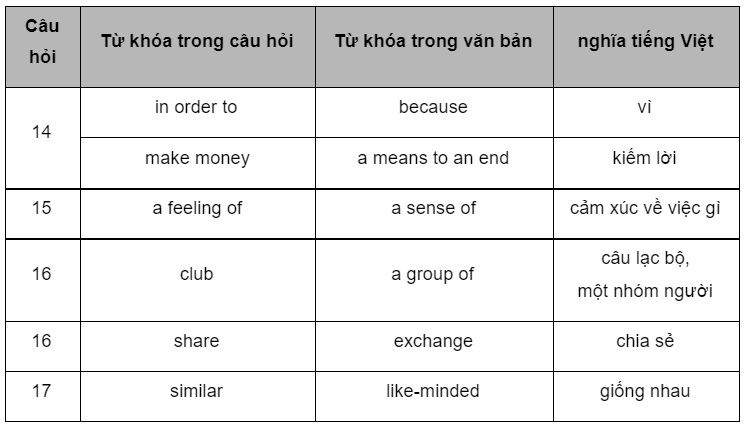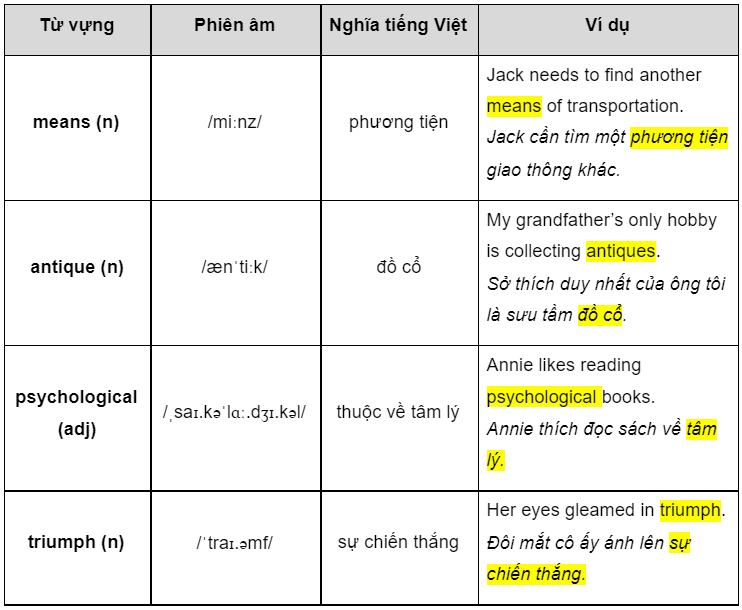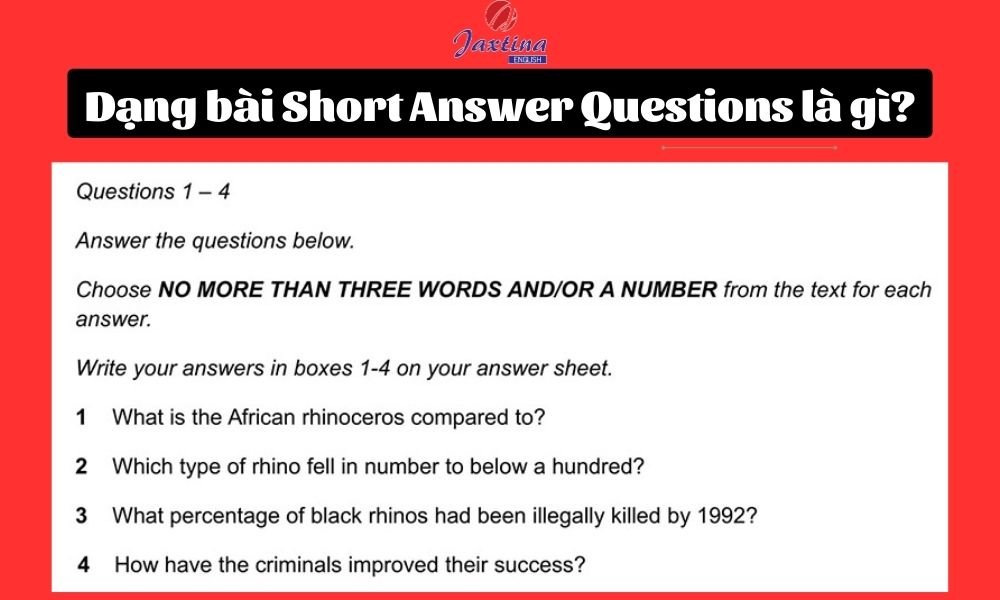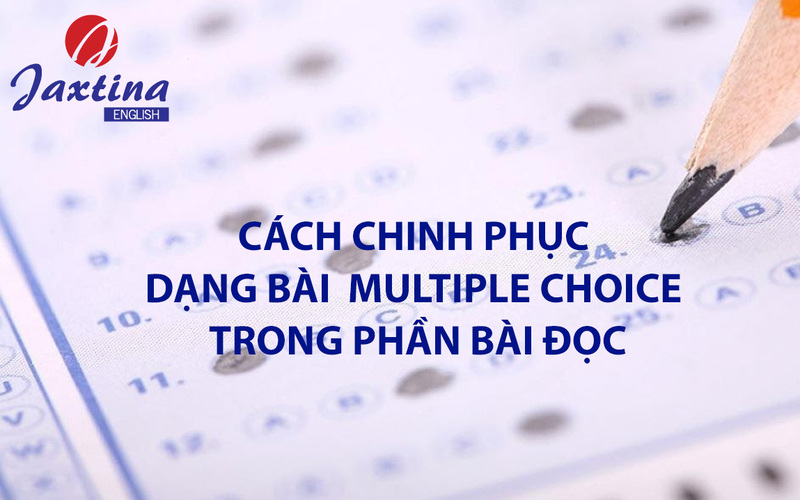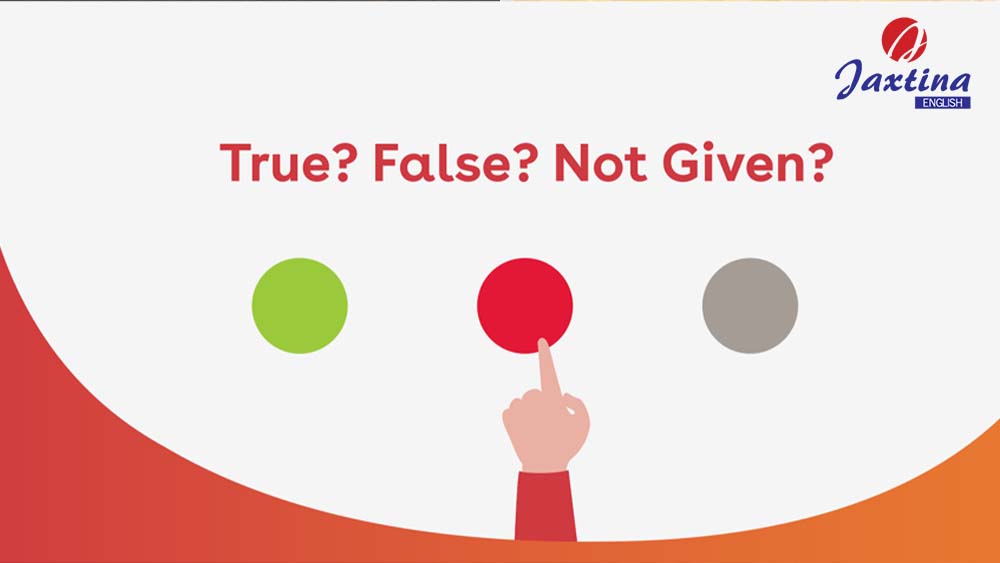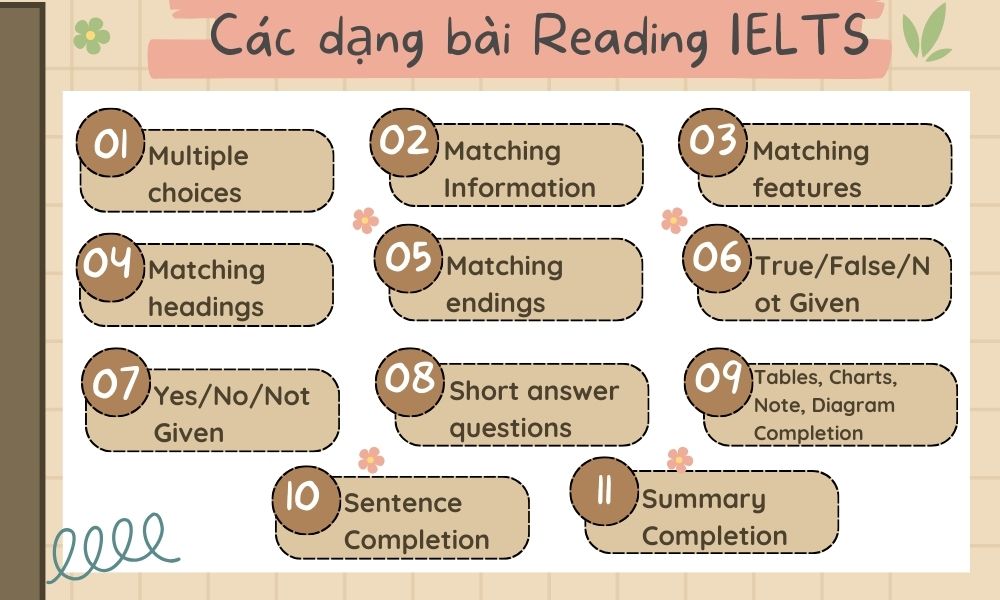4 bước làm dạng bài Short Answer Questions IELTS Reading
Phương pháp lập bảng KEYWORD TABLE trong IELTS Reading
Việc xác định được các keyword table và vị trí của chúng trong bài đọc là một kỹ năng quan trọng để chinh phục được bài thi IELTS Reading. Hôm nay Jaxtina sẽ giới thiệu cho bạn một bí quyết giúp bạn nâng band trong IELTS Reading, đó chính là phương pháp lập bảng keyword table. Vậy phương pháp luyện thi IELTS này là gì?
Đọc Thêm: Các dạng bài Reading IELTS và cách làm
Nội dung bài viết
1. Tổng quát
Trước tiên, chúng ta hãy cùng tìm hiểu các bước thực hiện phương pháp này nhé!
Bước 1: Đọc câu hỏi, xác định và gạch chân các từ khóa.
Bước 2: Quay trở lại văn bản, hãy tìm và gạch chân những từ/cụm từ mang nghĩa tương tự với những từ khóa bạn đã xác định ở bước 1.
Bước 3: Lập bảng keyword với những từ/ cụm từ bạn tìm được ở 2 bước trên.
Ví dụ:
| Câu hỏi | Từ khóa trong câu hỏi | Từ khóa trong văn bản | nghĩa tiếng Việt |
| 1 | took away | remove | loại bỏ |
Phương pháp này sẽ giúp bạn tập trung hơn vào kỹ năng tìm các từ/ cụm từ đồng nghĩa với nhau và hiểu các câu trả lời trong bài đọc hơn. Ngoài ra nó còn giúp bạn học được và nhớ thêm nhiều từ vựng mới. Đây là một phương pháp luyện đề IELTS rất cần thiết nếu bạn muốn nâng band điểm của mình đấy. Hãy thử luyện tập ngay với bài đọc dưới đây nhé!
Đọc Thêm: Cách luyện Reading IELTS hiệu quả
2. Bài tập
Identify keywords in the questions and in the text to create a keyword table, then answer the questions. (Xác định từ khóa trong câu hỏi và trong văn bản để lập bảng từ khóa, sau đó trả lời câu hỏi.)
COLLECTING AS A HOBBY
Collecting must be one of the most varied of human activities, and it’s one that many of us psychologists find fascinating. Many forms of collecting have been dignified with a technical name: an archtophilist collects teddy bears, a philatelist collects postage stamps, and a deltiologist collects postcards. Amassing hundreds or even thousands of postcards, chocolate wrappers or whatever, takes time, energy and money that could surely be put to much more productive use. And yet there are millions of collectors around the world. Why do they do it?
There are the people who collect because they want to make money – this could be called an instrumental reason for collecting; that is, collecting as a means to an end. They’ll look for, say, antiques that they can buy cheaply and expect to be able to sell at a profit. But there may well be a psychological element, too – buying cheap and selling dear can give the collector a sense of triumph. And as selling online is so easy, more and more people are joining in.
Many collectors collect to develop their social life, attending meetings of a group of collectors and exchanging information on items. This is a variant on joining a bridge club or a gym, and similarly brings them into contact with like-minded people.
Another motive for collecting is the desire to find something special, or a particular example of the collected item, such as a rare early recording by a particular singer. Some may spend their whole lives in a hunt for this. Psychologically, this can give a purpose to a life that otherwise feels aimless. There is a danger, though, that if the individual is ever lucky enough to find what they’re looking for, rather than celebrating their success, they may feel empty, now that the goal that drove them on has gone.
If you think about collecting postage stamps, another potential reason for it – or, perhaps, a result of collecting – is its educational value. Stamp collecting opens a window to other countries, and to the plants, animals, or famous people shown on their stamps. Similarly, in the 19th century, many collectors amassed fossils, animals and plants from around the globe, and their collections provided a vast amount of information about the natural world. Without those collections, our understanding would be greatly inferior to what it is.
In the past – and nowadays, too, though to a lesser extent – a popular form of collecting, particularly among boys and men, was trainspotting. This might involve trying to see every locomotive of a particular type, using published data that identifies each one, and ticking off each engine as it is seen. Trainspotters exchange information, these days often by mobile phone, so they can work out where to go to, to see a particular engine. As a by-product, many practitioners of the hobby become very knowledgeable about railway operations, or the technical specifications of different engine types.
Similarly, people who collect dolls may go beyond simply enlarging their collection, and develop an interest in the way that dolls are made, or the materials that are used. These have changed over the centuries from the wood that was standard in 16th century Europe, through the wax and porcelain of later centuries, to the plastics of today’s dolls. Or collectors might be inspired to study how dolls reflect notions of what children like, or ought to like.
Not all collectors are interested in learning from their hobby, though, so what we might call a psychological reason for collecting is the need for a sense of control, perhaps as a way of dealing with insecurity. Stamps collectors, for instance, arrange their stamps in albums, usually very neatly, organising their collection according to certain commonplace principles – perhaps by country in alphabetical order, or grouping stamps by what they depict – people, birds, maps, and so on.
One reason, conscious or not, for what someone chooses to collect is to show the collector’s individualism. Someone who decides to collect something as unexpected as dos collars, for instance, may be conveying their belief that they must be interesting themselves. And believe it or not, there is at least one dog collar museum in existence, and it grew out of a personal collection.
Of course, all hobbies give pleasure, but the common factor in collecting is usually passion: pleasure is putting it far too mildly. More than most other hobbies, collecting can be totally engrossing, and can give a strong sense of personal fulfilment. To non-collectors it may appear an eccentric, if harmless, way of spending time, but potentially, collecting has a lot going for it.
Questions 14-17
Complete the sentences below.
Choose ONE WORD ONLY from the passage for each answer.
- The writer mentions collecting ____________ as an example of collecting in order to make money.
- Collectors may get a feeling of ____________ from buying and selling items.
- Collectors’ clubs provide opportunities to share ____________.
- Collectors’ clubs offer ____________ with people who have similar interests.
Gợi ý bảng Keyword |
Hiện trung tâm Jaxtina English Center đang có nhiều chương trình ưu đãi học phí khi đăng ký combo 2 khóa học IELTS cho người mới bắt đầu trở lên cũng nhiều khuyến mãi khác. Điền ngay thông tin vào form bên dưới để đăng ký nhận thông tin chi tiết về chương trình ưu đãi nhé!
Đọc Thêm: Phân biệt true false not given
Trên đây Jaxtina đã chia sẻ cho bạn về phương pháp lập bảng keyword, mong rằng bài viết này sẽ bổ ích cho bạn. Và hãy tham khảo ngay các khóa học IELTS của Jaxtina English Center nếu bạn đang phân vân không biết chọn nơi nào để ôn luyện IELTS nhé, Jaxtina đảm bảo rằng bạn sẽ đạt được mục tiêu của mình sau khi các hoàn thành khóa học đó, còn chần chừ gì nữa, hãy mau đăng ký ngay để nhận được nhiều ưu đãi nhé. Jaxtina chúc bạn học tốt!
Nguồn tham khảo bài đọc: IELTS Cambridge 12
Đọc Thêm:

Đơn giản hoá việc học tiếng Anh

Tiên phong đào tạo
tiếng Anh toàn diện 4 kỹ năng.

